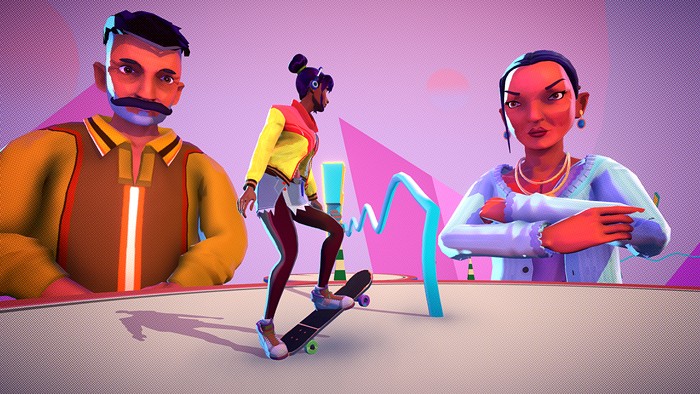Aliens, ghosts, machine guns, cars, lasers: Video games have revolved around some basic, dorky conceits for decades. But did you know that one of the earliest and most consistent gaming tropes was dating?
Though, admittedly, that began as “dating” in the scariest of scare quotes. While America was still in the grips of Pac-Man fever, a game called Softporn Adventure launched on home computers in 1981, complete with hot tub bikini ladies on the box. A self-selecting niche of '80s dweebs kept that trashy, heteronormative angle alive for years via PC series like Leisure Suit Larry. In the decades since, video games have taken all kinds of stabs at dating and romance, ranging from introspective, gender-fluid fare to one-dimensional “marry a lady for extra points” trash.
This week’s new game Thirsty Suitors, developed by a game studio with Seattle origins, has a name that you might expect to land on the hornier, gushier side of this gaming oeuvre. It’s anything but. Turns out, this ambitious, fun, and hilarious game is more coming-of-age than cumming-of-age, and its interactivity delivers unique and powerful cultural statements.
The game’s shortest tagline might be: “If the CW’s Riverdale was a video game, full of twentysomething South Asians reckoning with their sexuality amidst generational rifts.” In Thirsty Suitors, you play as Jala, a Pacific Northwesterner born to Indian immigrants and returning home from college to untangle her web of ex-boyfriends and -girlfriends. This plays out in fights that resemble “JRPGs” (think Final Fantasy or Persona), where you pick attacks and items from menus, then take turns popping off.
Yet Jala spills tea, not blood. Though the game’s fights see people jumping around and throwing punches, it’s all figurative stuff behind the real meat: verbal repartee. Jala’s mission is to emotionally wind up, then wear down, her exes and potential new suitors alike. By listening to what people say, you can more optimally select flirts, brags, put-downs, or other manipulative options. Pick the right stuff, and your opposition will succumb to their emotions.

In these kinds of games, players traditionally mash buttons to get to get to the so-called 'good' stuff, like guns or punches or whatever. The difference with Thirsty Suitors is that here, the bants are the good stuff, whether because they offer hints on how to aim your next verbal target or because they unearth the emotional weight behind each character’s childish barbs. Hence, you don’t want to mash through these mash notes, an aspect perhaps best proven out by the game’s first “boss,” an ex-boyfriend named Sergio. He’s hung up on Jala as a childhood sweetheart and appears as a clueless, one-dimensional man, caught projecting his neediness onto Jala without understanding who she has become as an adult.
Jala and Sergio continue to face off in increasingly meaningful ways, each time enjoying richer dialogue that either references their childhoods or their evolving dynamic. The same goes for Jala’s other exes, who have much rockier relationships, not to mention entirely different squabbles with Jala’s family members. Every character in Thirsty Suitors kind of sucks at the outset, each with different faulty coping mechanisms that emerge in the form of shit-talking and smacking each other around.
In Thirsty Suitors’ case, each attack requires tapping buttons in specific order and timing, a gimmick often seen in Nintendo’s Paper Mario series, and this is not an accident. Rather, it’s meant to engage players with surface-level conflict while dialogue expands and rounds out backstories. One touching example comes when one of Jala’s exes finally gets to the point of her anger, after many, many back-and-forth exchanges: that her own Indian family disowned her for dating another woman, while Jala’s family found a way to embrace her bisexuality. This battle ends with breaking through, not breaking faces.
The game’s development staff includes significant South Asian roots, and the team clearly received a green light to lean into its cultural roots–particularly as main character Jala both blows up and affirms various Indian stereotypes for the sake of a genuine homecoming-gone-awry story. One major example is the game’s series of cooking challenges, where players manage pots, pans, and other cookware to create authentic Indian dishes instead of battling exes; all the while, either Jala’s mother or father watches and reacts. In these sequences, each parent first emerges as a stereotype–stern, disapproving mother, and kind, accommodating father. After cooking more dishes, players watch the parents soften into real people, their motivations laid bare with equal measure of regret and pride.
It’s also charming to walk up to items in the game, press a button, and see authentic jokes about the Indian immigrant experience in America–like a father insisting that someone should go buy some more phone cards, or a book lying around in the kitchen titled Mango Facts that Jala quips is one in a massive series. (And when you need a hint, the game has your back in the form of a family member who is, yes, named Uncle Hinti. LOL.)
And the dev team Outerloop Games unabashedly shows off their Seattle-area heritage with stories about being banned from the Tacoma Dome, send-up of local fictional icons (instead of the Weedle on the Needle, TS features a cult-ish brown bear named Soundie), and one of the game’s most powerful healing items being Pike Place Chowder. (“It’s worth the three-hour wait,” an in-game note reads.) It’s hard not to look at the game’s mix of strip mall buildings and forest-lined streets and imagine exactly which Seattle-area suburb with a substantial South Asian population Thirsty Suitors might be drawing from.
All of this lands elegantly as a video game, as opposed to a serialized TV series or long-form novel. Players start in Thirsty Suitors with button-tapping battles, ice-cold putdowns of dopey exes, and hints of a burning, mysterious conflict. Then some entertaining trappings emerge: increasingly good voice acting, catchy South Asian hip-hop beats, and a snappy, wholly optional skateboarding challenge system, where players can fake like Tony Hawk between conflicts. Each storyline is interrupted by text messages, new exes arriving in town, optional challenges, and adorable goodnight sequences with Jala’s endearing father, which combine to pace the plot and slow-cook each character’s development, like one of Jala’s mom’s kitchen specialties.
By filling out its virtual world with a community of genuine South Asian characters, Thirsty Suitors serves something rarely seen in gaming: non-white characters simply being, existing, with their own shared pool of references and experiences as touchstones for plot continuity. It’s much, much different than the game industry’s typical “diversity” efforts that merely change some 3D polygons’ colors and outfits, all while the game in question still feels predominately white and cis-het male. Thirsty Suitors is a far more successful version of checking boxes on a diversity list: it takes familiar, fun gaming concepts, and uses them to tell a refreshing yet accessible story that compels us to tap its smack-talk buttons one more time, over and over.
Thirsty Suitors is now available for digital purchase on Xbox, PlayStation, Switch, and Windows PCs. Learn more at the game’s official website.














